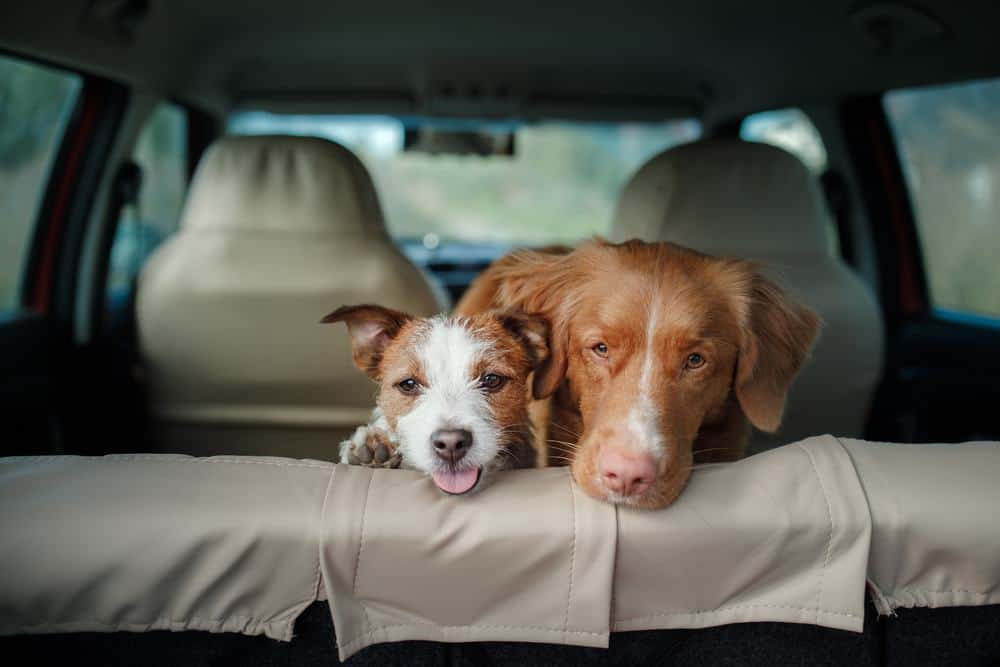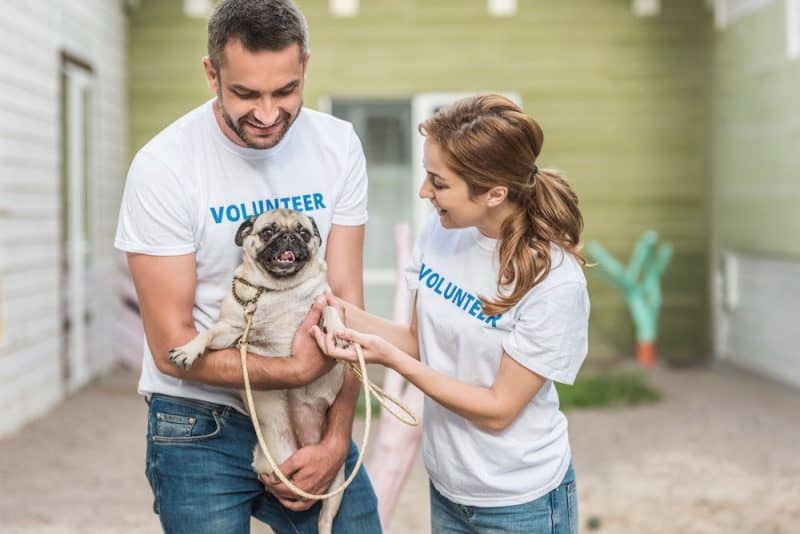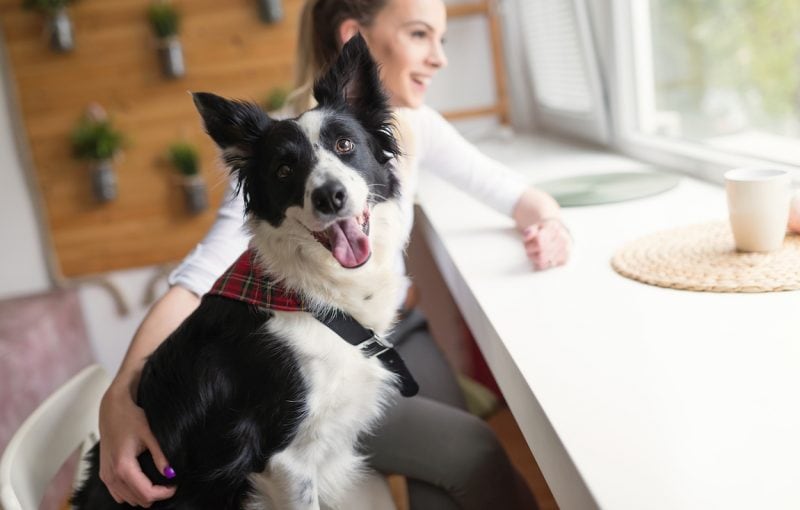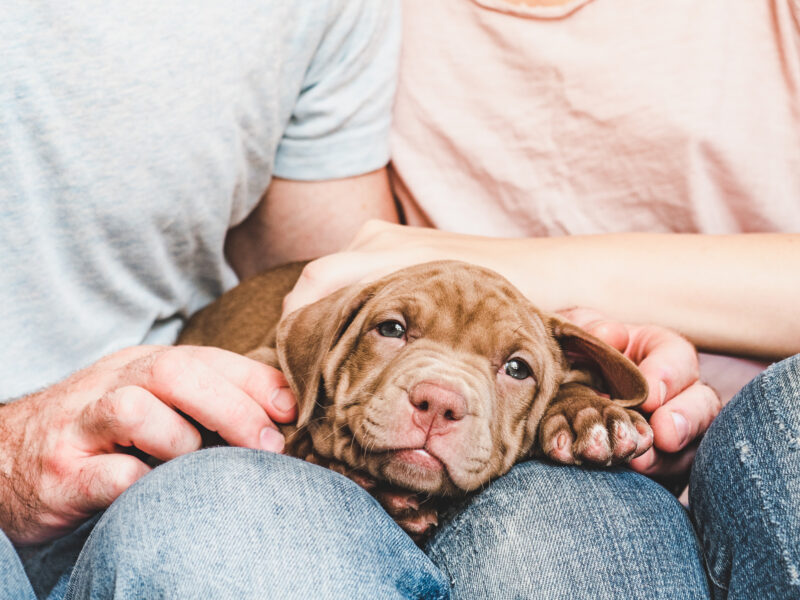“He’s from Costa Rica,” the woman explained, while her dog barked and lunged at me, surging at the end of his leash. While the little Chihuahua wasn’t exactly the scariest dog I’ve ever worked with, he was one of the most stressed-out. His eyes were bulging, and his feet were scrabbling at the ground.
When I backed up a bit, he stopped barking and went straight to trembling, his tail tucked all the way to his belly. He flinched when his owner shifted her weight. The woman added, “I need help.”
Adopting a dog shipped from down south — whether you mean the southern US or beyond the border — is not an undertaking to take lightly. The “underhound railroad” is full of heartwarming success stories that showcase the best of humanity, as well as questionable motivations and seedy, underhanded tactics to pawn off problem dogs.
In short, it’s complicated.
Today we’re exploring the dark underbelly of the underhound railroad, how dog flippers seek to profit off of unwary adopters, and morally-questionable strategies shelters use to lower their euthanasia rates.
My Personal Experience With the Underhound Railroad
I have particularly convoluted feelings about shipping dogs due to my experiences dealing with refugee canines. From December 2016 until March 2018, I worked at the US’s fourth-largest open-admission animal shelter, the Denver Dumb Friends League. While I worked there, the shelter brought 40+ dogs up from Puerto Rico after Hurricane Maria, over 1,000 dogs from an overworked shelter in Texas, and a few dozen dogs per week from partner shelters in Oklahoma.
I saw firsthand the amazing second chance that some of these dogs got by coming to wealthy, urban Denver. I also saw firsthand the shady marketing tactics of other rescues (not Denver Dumb Friends League, but other organizations) and the severe behavioral and health issues that may come with shipped dogs from the south.
The Pros and Cons of Getting Your Dog Shipped from Down South
There’s no easy answer to whether or not you should get your dog shipped from down south. There are plenty of horror stories and success stories to nudge you towards either side of the fence. My suggestion is simply to proceed with caution if you do decide to adopt a dog from the south.
If you can stack the deck in your favor by working with a fantastic rescue that has the resources to support you, adopting a dog from the south can be a life-changing experience in which you provide a loving home to a dog who desperately needs one.
However, if you are swindled by a dog-flipper into adopting a fearful and sickly dog, you made a profit for the dog-flipper and ended up with an extremely challenging new pet. Some people, like my client with the Chihuahua from Costa Rica, can make the most of this unfortunate situation — but it’s a lot of work, and honestly, not a task that all owners will be up for.
I want to make it clear that I know the vast majority of shelters and rescues are doing the very best they can. No one cares more about homeless pets than underpaid and overworked shelter staff.
Shelters that seem unethical generally have good explanations for why they operate in a given way. It’s up to you to educate yourself on the pros and cons, then asses your own feelings about the situation and make your own decision.
Adopting a Dog from Down South: The Upsides
There are a lot of benefits to adopting your dog from the south, particularly if you are in a wealthy, northern city. While your new southern dog might not appreciate the snow, there are great arguments for why you should adopt your dog from the south.
You help alleviate stressed-out shelters. Many shelters around the country are stuffed to the brim, forcing them to euthanize animals simply because there’s nowhere to put the pets. This is not a judgement on my part – it’s a sad truth.
Some communities simply have far more dogs in shelters than there are homes looking for dogs. Some shelters have formed partnerships to deal with this overpopulation. This allows overstuffed shelters to send dogs to shelters with space rather than euthanizing them.
If you don’t ask, you might not even know that your dog came from the south. At Denver Dumb Friends League, we got a truckload of dogs each week from a shelter in Oklahoma, and several more truckloads every month from Texas.
Many adopters at the shelter were helping southern dogs without even knowing it. While Denver Dumb Friends League disclosed that these dogs were from the other shelters, many people simply didn’t pay attention to this note.
You save the life of easy-to-adopt dogs. In dramatically overstuffed shelters, it’s not uncommon for a four-week-old puppy to grow into a two-year-old dog without being adopted. In many cases, that dog may be euthanized after a given period of time – not due to any behavior or medical issues, but simply because there are not owners looking to adopt.
Shelters can help each other out by moving easy-to-adopt dogs to urban shelters where they have a chance at getting adopted.
This can go both ways — see the “dog flipping” section below.
You have more choices. It’s a surprising truth that in some parts of the country, there’s actually something of a shelter dog shortage. If Denver Dumb Friends League hadn’t transferred in dogs from Texas and Oklahoma, our dog adoption pool would have often been empty.
Even with shipments of dogs from the south, we still had some days where the adoption area only had one or two dogs left. Potential adopters get access to a larger selection and variety of dogs, thanks to transfers from down south.
You avoid backyard breeders and puppy mills. On the days where Denver Dumb Friends League had no dogs up for adoption (or no puppies), occasionally people would say that they were going to go looking for a dog elsewhere.
There’s a decent chance that these would-be owners ended up supporting backyard breeders or puppy mills – whether they’re aware of the ramifications or not. When shelters can partner to bring in more dogs (especially puppies), this helps keep people coming back to shelters and rescues rather than turning to other sources for their dogs.
You can feel good about saving a life. The bottom line is that adopting a shelter dog is an amazing thing. You have the opportunity to give a dog who has had a rough time an entirely new life — hopefully one that’s far better than his first home. This is especially true with dogs that come from underserved shelters down south.
Adopting a Dog from Down South: The Downsides
There are lots of reasons to adopt a dog from the south. But we cannot write this article without also touching on the downsides and dangers of adopting a dog from down south. We’ll also discuss how to avoid each downside in turn.
One major downside of southern dogs is the cost involved. Not for the owner necessarily, but for the shelters receiving these wayward canines.
Many southern dogs end up being far more expensive for an organization to manage (thanks to transportation service costs, vaccines, and other expenses).
This often forces organizations to choose between cutting costs by “flipping dogs,” skipping vaccines and healthcare, or only focusing their efforts on easy-to-adopt puppies.
Specifically, the downsides to adopting a dog from the south include:
You might support the practice of dog flipping. Dog flipping is the unfortunate practice of adopting (or even purchasing) a dog in one part of the country, then adopting the dog out at a much higher fee elsewhere in the country. This is generally done with puppies.
It can be hard to distinguish whether a rescue is truly helping give easy-to-adopt dogs a chance, or is focusing on profit.
This is generally done with puppies. It can be hard to distinguish whether a rescue is truly helping give easy-to-adopt dogs a chance, or is focusing on profit.
Avoid this by: steering clear of rescues that exclusively transport dogs in from elsewhere. Look for rescues that support their own communities by working with local dogs, in addition to shipped up pooches. Be especially leery of rescues that charge extra-high fees for their dogs or deal almost exclusively in puppies.
Your new dog might have serious health issues. Heartworm and other scary diseases are far more common in warmer climates. Some southern dogs have conditions that are rare in your area, which makes them more difficult to treat in other parts of the country. Even worse, you could be bringing a new disease into your area that could spread to other dogs.
Avoid this by: asking the rescue about health tests before adopting your new dog. At a minimum, a rescue dog should have had a heartworm test and booster shots while at the rescue. If the rescue can’t or won’t provide that information and that test, walk away. Rescues that can’t afford basic medical treatment and care for their dogs (like heartworm tests) should not be in operation.
Your new dog might be undersocialized or have other behavior concerns. You certainly can end up with a behaviorally challenging dog no matter where you get your dog. That said, almost every single one of the most extremely undersocialized and fearful dogs I’ve worked with came from the south.
Some of these dogs had never been indoors before, others were born in the shelter and never left their kennel. Adopting a dog from the south seems to raise your risk of adopting a severely undersocialized dog.
Avoid this by: getting to know the dog first. We talked about this at length in our article series on how to adopt a shelter dog. Start by deciding what you’re looking for in your dog. Then go into the adoption consult prepared to ask a lot of questions.
If you are prepared to work with a difficult dog, then I applaud you. But try not to let yourself fall in love with a dog that’s wrong with your family and your lifestyle. There will be someone else with a quieter home who can come along and adopt that
You might end up with a breed or mix that isn’t right for you. This pitfall can happen to anyone, but it seems more common with southern dogs. Why? In my experience, hunting breeds and hound dogs are more common in southern shelters. These dogs are bred to work, chase, bark, and work some more. It can be incredibly difficult to keep that beautiful redbone coonhound happy in downtown Denver — and even more challenging to keep your neighbors happy with your new baying bestie!
Avoid this by: understanding the breed or mix that you’re looking at. In general, hound dogs are terrible choices if you have shared walls. It’s also important to understand your dog’s specific history. A pointer that used to live in an outdoor kennel and go hunting on the weekends might be a holy terror in your apartment, even if you have the time for exercising him appropriately.
You could accidentally take a dog from a loving family after a disaster. There are terribly sad stories of dogs that were rescued from hurricanes and adopted out, only to discover that their owners were still desperately looking for them. While adopting a dog directly after a disaster sounds like an amazing way to do good, you might actually be inadvertently taking a dog from a loving owner.
Families that lose their pets during hurricanes need time to track their dogs down, particularly if their dogs were not microchipped. Speaking of that, get your dog microchipped!
Avoid this by: waiting to adopt until the chaos of a disaster has subsided. Support rescue efforts by donating your money, time, or skills to reunifying owners with their pets. Consider fostering for a while!
You might be taking resources away from local dogs. Shelters and rescues that devote too many resources to southern dogs might end up not putting enough resources towards local dogs. This balancing act will be a bit different for every unique organization. Organizations that exclusively focus on bringing in dogs from the south often leave local dogs in the dust. This is especially true with organizations that bring dogs in from other countries.
The costs associated with rescuing a dog from a Korean meat farm or the streets of Panama are staggering. Organizations can help far more dogs by focusing their efforts on dogs that are closer to home.
Avoid this by: supporting organizations that work with local dogs and southern dogs. Be skeptical of organizations that bring in dogs from other countries.
At the end of the day, many of these concerns can be avoided by adopting your dog from a reputable rescue or shelter. In Colorado, a PACFA license is necessary for a rescue or shelter to operate. There is no federal oversight on this issue, but you can get to know the hallmarks of a good rescue as a starting point.
Adopting a dog from the south can be a great decision that helps save a life. You might just find your dream dog in the latest group of dogs that were driven thousands of miles to make it to your city.
But adopting a dog from the south is also a complicated decision. Rescues and shelters can have competing incentives, leading to shady practices and unfortunate adoption stories. Doing your due diligence will ensure success for you, your dog, and your organization.
Have you ever adopted a dog that was shipped up north from down south? How was your experience? Share your stories in the comments!








Leave a Comment